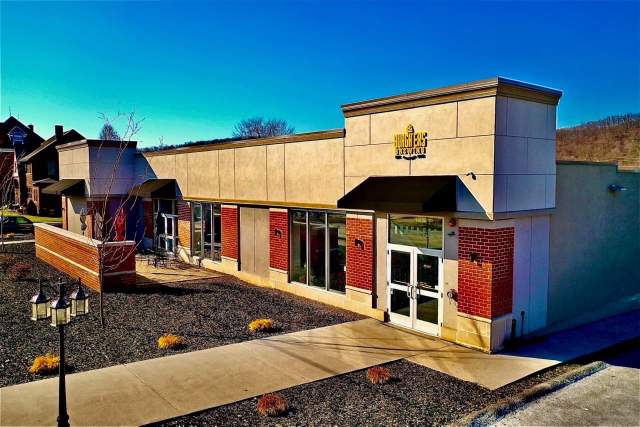
Burgh’ers Brewing is a smash burger joint and craft brewery with two locations on the opposite ends of greater Pittsburgh — Lawrenceville and Zelienople. Burgh’ers as a brand is celebrating a decade of business in 2020 on the restaurant side. Its two farm-to-table, Sustainable Pittsburgh Platinum level designation restaurants specialize in ridiculously good hamburgers like the Fox Chapel, a two time James Beard Foundation’s Blended Burger project winner, smashing goat cheese, mixed greens, pickled onion, balsamic reduction and beef into mind-blowing burger form.
Burgh’ers Brewing began in 2017 as an extension of these smash burger eateries, focused on brewing approachable lagers and ales that pair nicely with high-end pub grub. When asked to describe the brewery’s beer selection, Neil Glausier, co-owner and brewmaster, explains:
“I make beer flavored beer,” he said over the phone. “We’re a restaurant, so we sell a shit-ton of food, so most of my beers are all beer flavor. I don’t do a whole lot of hype beer, but I keep everything from New England to Euro lagers on hand. I like really going through the style catalog and keeping things seasonal and food friendly, as well as interesting. We do a lot of charity beers that are collaboration based. I do a fruited sour that we rotate a guest fruit with Blackberry puree. We benefit the Children’s Hospital Free Care Fund with that guy. That’s probably on the edge of what we make, but we keep a lot of classic styles and then a few newer more adventurous varieties.”
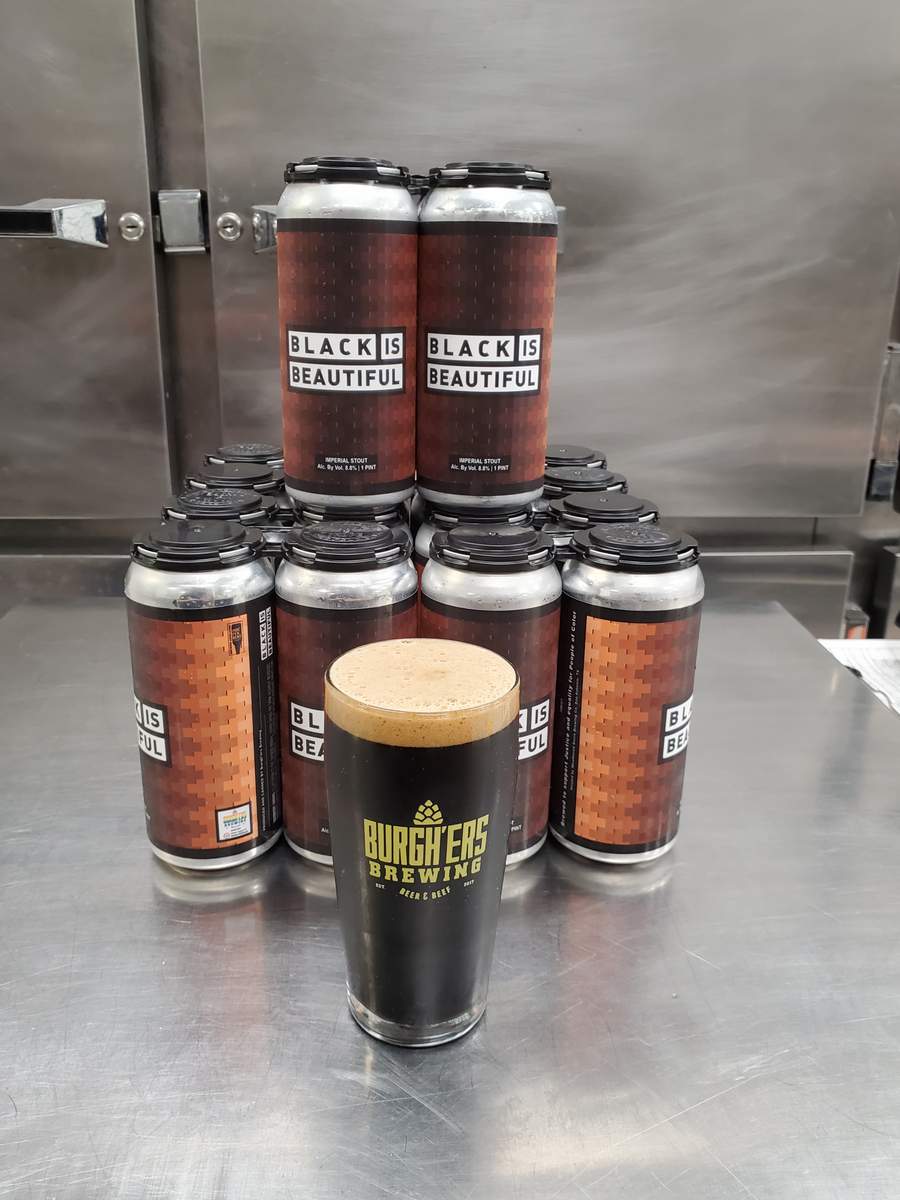
Adventurous beer and community outreach have been a continual focus for Burgh’ers Brewing as its adapted to new business tactics under the pandemic. In conjunction with its 10th anniversary, the brewery has launched its canning line — a gift to themselves that has been a dream of Glausier’s since the brewery opened, but was expedited due to the current state of business. The inaugural canned beer release was in August and took place alongside the debut of another awareness beer — its Black Is Beautiful brew that supported the Urban League of Greater Pittsburgh (ULGP). Burgh’ers created its own version of the Weathered Souls Brewing Co. imperial stout, adding some subtle changes. It is also donating 100 percent of the proceeds from the beer to the ULGP for a year.
Black Is Beautiful is easily the most important beer of 2020 and is another example of Burgh’ers Brewing’s community-focused portfolio, and its new Alpha canning line represents maybe the most important new business trend for craft breweries in 2020 — distribution specifically with cans. We rang up Glausier to get his insights into the sudden decision to buy a canning line and start packaging during the pandemic.
Beer Cannon
Burgh’ers invested in an Alpha Brewing Operation‘s Beer Cannon II, a compact canning line that typically can handle up to 20 cans per minute (cpm) but can also be adjusted up and down. With a focus on minimal dissolved oxygen pickup and maximum flexibility, the Beer Cannon Series touts unique features like its dual lane design, expandability (20 to 80 cpm), servo motor technology, patent pending can weigh scale, revolver lid magazine and lots more (check it out here).
“We’re using the Beer Canon line that can handle 20 cans per minute,” said Glausier. “We didn’t get a labeling system added to it as it would have added another several thousand dollars and another 6 ft of linear space that I don’t have, considering we hadn’t really anticipated putting a canning line in this small space. But the Covid-19 business model dictated that we try to pivot with more takeout friendly apparatuses here.”
Pandemic Advice: Inventory Analysis
“There’s no room in the budget to really waste anything,” said Glausier. “Tightening the belt was, of course, the first thing. It shouldn’t just be across the board, but we went through our entire inventory with a fine-tooth comb and analytically looked at unit price production. Just like the things that actually make money and the things that were being wasted, which is part of our philosophy anyway, being a Platinum sustainable restaurant. We went through and we found all the highest waste things in both cost as well as trash. We eliminated them across the board. We reduced the availability on our menu and kind of cross leveled everything down to a sturdy measure. It’s been like a 13 percent improvement to our actual cost and margin. It’s been really eye-opening, and we’ve started making our 120-day meeting an inventory analysis. Every six months we’ll start looking at those things again.”
Compact and micro canning lines have been around for a while, but they have taken on renewed importance and interest during the pandemic’s business environment. Units have gotten impressively compact. Cask offers its MCS: Manual Canning System that’s only 4 ft2 and can handle 10 cpm or 25 cases per hour via a two-head fill station with a seamer and a lot of elbow grease. Twin Monkeys offers the Mancos, the world’s first automated nano-canner that can handle 5 to 15 cpm and only weighs 250 lbs.
From those ultra-small units, canning lines grow in choices, sizes, cpm, seamers, automation and overall sophistication. Most of them can handle a variety of can sizes and increasingly crowlers as well. Alpha and Wild Goose are two other great brand names offering small and mid-sized canning lines for craft brewers. Glausier considered both brands.
“The prices are all competitive, but since Alpha was bidding for [our upcoming] production brewery expansion, the canning line was included in the production brewery quote,” explained Glausier. “We just pulled it out of the quote early and adapted it to the tiny brewery here that can’t support a depalletizer. We don’t have the space for it. Simultaneously, I was looking at Wild Goose because they do have a little bit more, in my opinion, specifications, output/throughput type of thing. The mobile can guys really abuse the shit out of those, but I went ahead and took my Alpha unit, which is a very nice tool. This thing is well beyond what we’re capable of.”
Canning during the pandemic
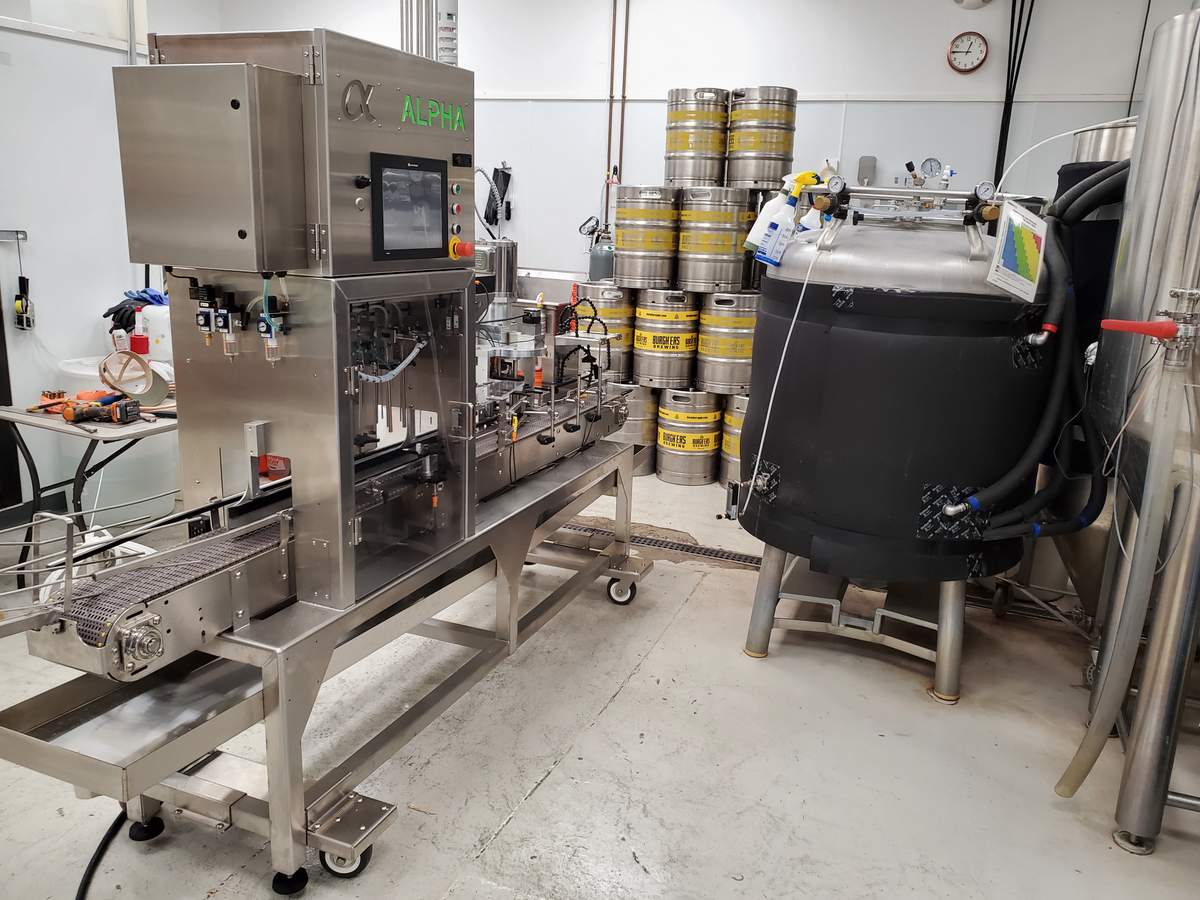
Right now, Burgh’ers Brewing is selling its beers in draft and via four-pack cans and takeout at its two taprooms locations. In the past few years, the company did about 500 bbls of beer in draft form only. Now it’s looking to hopefully recover some of that lost on-premise revenue with beer sales to-go. The Zelienople and Lawrenceville locations are currently operating at 25 percent capacity and parties are limited to one hour of dining. Guests order on digital menus via QR codes, hand sanitation stations are everywhere and everyone’s wearing a mask. The pandemic pivot has not been easy.
“We had to let go of roughly 65 percent of our staff, which you know, was a hit to the chin for us,” said Glausier. “We take care of our people, and it’s part of our whole ethos — treat good people well and provide a safe and awesome workspace for them. A lot of them had to be let go, and that’s shifted the load into our lap. We’ve got two taprooms and the production facility that are three separate entities that we have to cover 35 miles to maintain. It’s just a constant whirlwind of chaos to keep all those balls in the air.”
On top of all that, let’s not forget canning lines require a learning curve. Glausier was previously an automation and avionics engineer and even he struggled at first getting his canning line up and running.
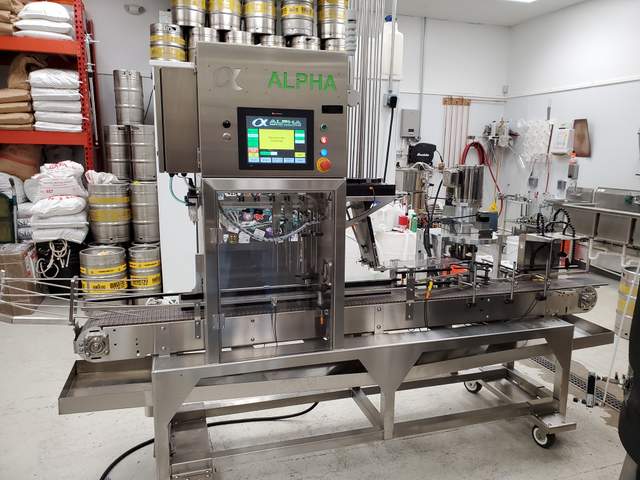
“I would definitely pay extra for the engineering commissioning, which Covid kind of preempted for us,” said Glausier. “The engineers couldn’t travel, but definitely do whatever you can to get the commissioning. When you buy your new system and if you are not mechanically or automation inclined, go stand around your neighbor’s system and watch them work and just get into the general routine of things and what to look for in those key areas. Like I talked to Cinderlands Beer Co. and 11th Hour Brewing Co. They have the same can line, and I just went and watched them work, just to get an idea of what to expect. I had a little bit of preparation, but not much. The rest of it was just a really getting to a point of accuracy through trial and error.”
Luckily, the Pittsburgh beer scene is strong, and Burgh’ers will hopefully have the backing of communities and friends.
“Man, we have a wonderful brewing situation here,” said Glausier. “There’s so many different varieties of styles and motivations. We have like 16 here, and there’s plenty of room for others to come into this market. You can’t go wrong walking into a Pittsburgh brewery. They’re making exceptional beer. The fact that pretty much every one of your neighbors is making exceptional beer is driving the quality baseline so much higher than anywhere else that I’ve gone to. If you want to hang out in this market, you’d better bring your A-game.”
In Pittsburgh? Then find some of Burgh’ers Brewing A-game — now in cans — flagship selections like its 1890 Lager and Jack Rabbit DIPA. We’ll keep you up to date on any future details regarding local distribution.

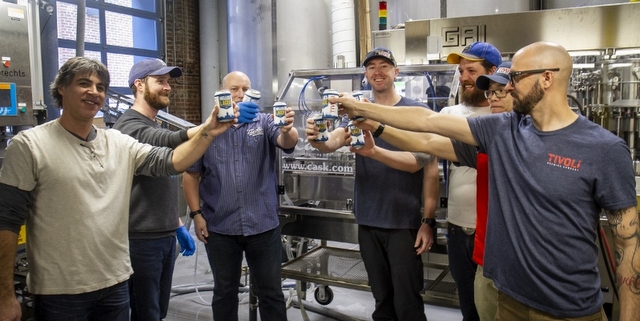
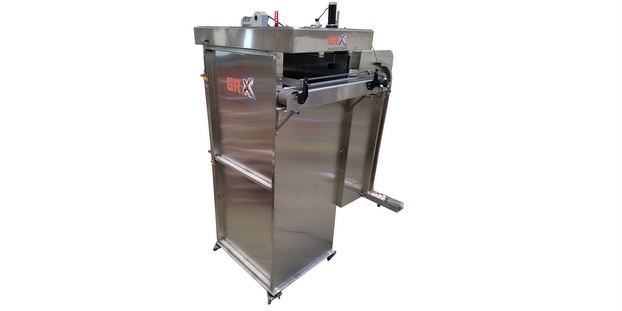
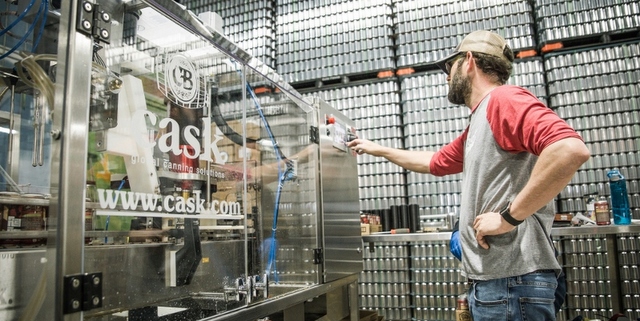
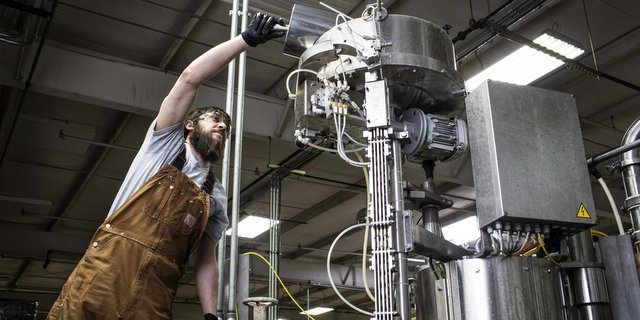
Alpha Brewing Co says
@BurghersBrewing Cool! But you’re probably trying to tag @alphabrewops